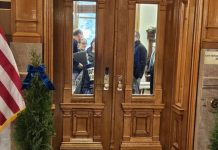Scott ruers for www.theindianalawyer.com
The Indiana Court of Appeals ruled Tuesday the University of Notre Dame Police Department is a public agency under the Indiana Access to Public Records Act and is subject to APRA requests, overturning a trial court decision in St. Joseph Superior Court.
The COA remanded the case to the lower court, ordering it find in favor of ESPN. The COA said the trial court must determine which records the police department was required to produce under APRA and produce only those records, not all of the public documents ESPN sought.
ESPN investigative reporter Paula Levigne filed a request for public incident reports in Sept. 2014, but the ND police department denied the request, saying it was not a public law agency. After two decisions by Indiana’s Public Access Counselor which said Notre Dame should produce the documents, ESPN filed a complaint in St. Joseph Superior Court. Both parties filed cross motions for judgment and on April 20, granted judgment in the police department’s favor, saying it was not a public agency. ESPN appealed.
The COA said that all of Notre Dame is not a public agency, but its police department is. It cited an Ohio Supreme Court decision that said a private entity is only considered a public agency when it performs a government function, which Notre Dame does not as a university, even though its police department does.
“Here it is clear that the police department is exercising a public function,†Judge Rudolph R. Pyle wrote for the COA. “Police power is a sovereign power. Even though the Police Department is not a governmental entity, the State has delegated its officers these (g)eneral police powers, including ‘the power to arrest, without process, all persons who commit any offense within the view of the officer (s).†Pyle cited Indiana Code 21-17-5-4 (a) in his writing.
However, how much precedence and effect the case will have is still in question since the Indiana Legislature recently passed a bill that would put into state law federal requirements of private college crime reporting, which is limited compared to other police departments.
During arguments Feb. 24, ESPN argued public policy, legislative intent and precedent in Indiana and other states favored a decision in favor of the company. Notre Dame said because it is a private institution, its records are its own and worried what the effects of a decision saying otherwise would mean not only for itself, but for other private institutions.
ESPN also challenged the trial court’s decision that its claim should be blocked by legislative acquiescence. The COA said legislative acquiescence shouldn’t exist because the public access counselors’ decisions have existed for just over a decade, which is not enough time to determine whether the legislature has acquiesced to the determination or not.
The case is ESPN, Inc. and Paula Lavigne v. University of Notre Dame Security Police Dept., a Dept. of the University of Notre Dame du Lac,71A05-1505-MI-381.




